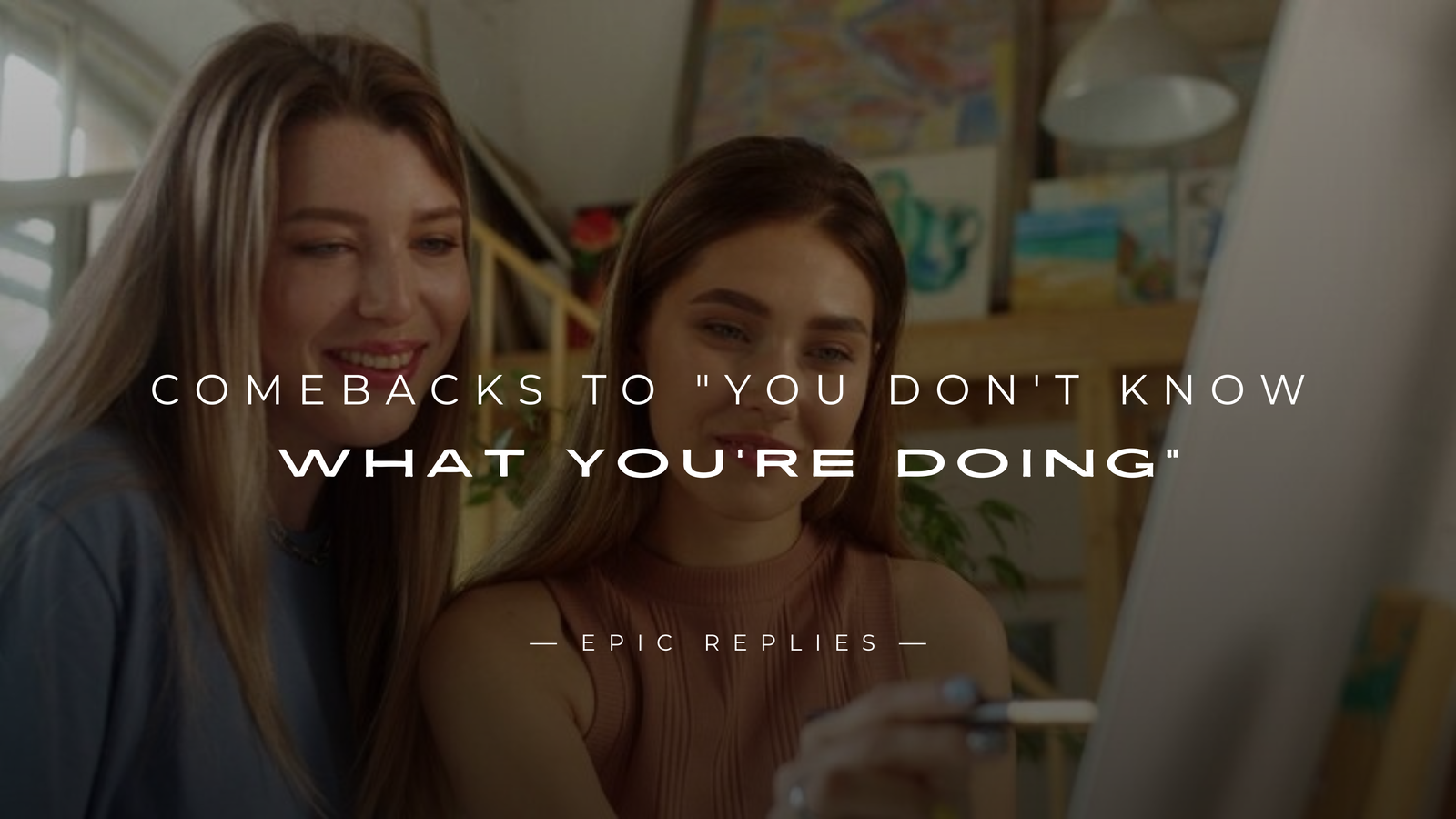The phrase “You Don’t Know What You’re Doing” is one of those comments that can instantly make you second guess yourself. It is short, direct, and often loaded with criticism. Someone might throw it at you during work, in an argument with a friend, or even on social media. The sting comes from the implication that you are incompetent or clueless. But here is the truth: you have more power than you think in how you respond. A strong comeback can shut down negativity, show confidence, and keep the focus where it belongs. In this article, we will break down why people say “You Don’t Know What You’re Doing,” explore different types of comebacks, and give you practical strategies to handle this situation with confidence. By the end, you will have a toolbox of responses that you can adapt to different scenarios, whether in professional life, personal relationships, or online interactions.

250+ Clever Comebacks to “You Don’t Know What You’re Doing”
Sarcastic
- Wow, thanks for the groundbreaking discovery.
- Hold on, let me write that down in my diary of obvious facts.
- Really? And here I thought I was nailing it.
- Shocking. Next you’ll tell me water is wet.
- Thanks, Captain Obvious, you’ve saved the day again.
- I’d never have guessed without your expert opinion.
- You must be exhausted pointing out the obvious all day.
- Great, now the world finally knows my secret.
- Truly, your insight is unmatched.
- Tell me more, Socrates.
Playful
- You’re right, but doesn’t that make it more exciting?
- Maybe not, but it’s fun pretending I do.
- I like to think of it as freestyle living.
- I’m just trying to keep life interesting.
- Hey, it worked in the movies.
- Winging it is my superpower.
- I may not know, but I’m having a good time.
- Isn’t guessing half the fun?
- Improvisation is the art I’m perfecting.
- If I knew, it would be boring.
Confident
- I know enough to get it done.
- I don’t need to know everything, just enough to succeed.
- I’m figuring it out as I go, and it’s working.
- Not knowing is just the first step to mastering it.
- My results will speak louder than your doubts.
- I trust myself to handle it.
- Knowing comes with doing, and I’m doing it.
- I’ll get there, no question about it.
- I don’t need approval to move forward.
- I’ve got this, whether you see it or not.
Self-Deprecating Humor
- I barely know what I’m doing with my life either.
- Don’t worry, clueless is my natural state.
- I’ve made it this far on pure confusion.
- Honestly, I’m just here for the snacks.
- My strategy is called “figure it out later.”
- Knowing what I’m doing is overrated.
- If there’s a prize for guessing, I’ll win.
- My plan is 80 percent luck, 20 percent winging it.
- At least I’m consistently clueless.
- I thrive in chaos, so this is perfect.
Mock Agreement
- Finally, someone understands me.
- That’s exactly what I was going for.
- Correct, it’s my signature style.
- You’ve caught me red-handed.
- Absolutely, I’ve been keeping it a secret.
- Right again, Sherlock.
- I was hoping nobody would notice.
- Yes, that’s how I roll.
- Congratulations, you cracked the code.
- Nailed it, that’s my whole plan.
Reverse Uno
- Funny, I was just about to say that to you.
- Interesting, I could say the same.
- That’s bold coming from you.
- Really? Looks like you’re projecting.
- Says the expert in not knowing.
- Strange, you seem lost too.
- Takes one to know one, right?
- You’ve been my role model in that area.
- I guess we’re in the same boat then.
- Pot, meet kettle.
Philosophical
- Do any of us truly know what we’re doing?
- Life itself is trial and error, isn’t it?
- Not knowing is part of the journey.
- Mastery begins with confusion.
- The wise admit they don’t know.
- We’re all improvising in this play called life.
- Knowing is an illusion, progress is real.
- Every expert was once lost.
- Isn’t the process more important than certainty?
- Even the greatest minds stumbled first.
Dry/Witty
- And yet, here I am still doing it.
- Somehow it seems to be working anyway.
- Funny how results don’t ask for permission.
- I guess ignorance looks good on me.
- Remarkable observation, truly profound.
- You should put that wisdom on a t-shirt.
- Amazing, I’ve been succeeding by accident then.
- I’ll add that to my growing list of non-problems.
- Thanks, I’ll consult my crystal ball next time.
- That must be why I’m having so much fun.
Savage
- I’d ask for your help, but we both know how that would go.
- Better than watching you pretend you do.
- I’d care more if your opinion mattered.
- And yet, I’m still ahead of you.
- I might not, but I’m doing better than you.
- You talk a lot for someone not doing anything.
- If I wanted mediocre advice, I’d ask you.
- Funny, my mess looks cleaner than your effort.
- Keep watching, you might learn something.
- At least I’m trying, unlike you.
Petty
- Neither do you, but at least I admit it.
- You sound confident for someone who’s usually wrong.
- Remind me again how well your last plan worked.
- That’s rich coming from you.
- Funny, I don’t see you doing any better.
- If I wanted average advice, I’d ask you.
- That’s cute, you think you know.
- Guess it runs in the family.
- Don’t project your struggles onto me.
- Coming from you, that’s almost a compliment.
Deflecting with Positivity
- That’s the fun part, figuring it out.
- Mistakes are just stepping stones.
- Not yet, but I’m learning fast.
- It’s all about the journey anyway.
- I’d rather try and learn than stay still.
- That’s how new ideas are born.
- Every pro starts clueless, right?
- Not knowing keeps it exciting.
- Great, more chances to grow.
- That’s why I’ll end up better at it later.
Confusion Play
- Wait, what am I doing again?
- Perfect, now I’m confused too.
- I thought you were in charge.
- Oh no, did I miss the instructions?
- Can you remind me what I signed up for?
- Hold on, we’re supposed to know?
- Good point, I’ll just keep guessing.
- Plot twist, neither of us knows.
- If I’m lost, at least I’m in good company.
- You mean this wasn’t a freestyle competition?
Overconfident
- I don’t need to know, I just win.
- Not knowing is part of my genius.
- Watch me turn this into a success anyway.
- I’m so good I don’t even need instructions.
- You’ll thank me later when it works.
- I only look lost because I’m innovating.
- I could do this blindfolded.
- Don’t worry, I always land on top.
- Knowing is optional, results are guaranteed.
- My chaos always turns into brilliance.
Meta/Breaking the Fourth Wall
- This is the part where the underdog surprises everyone.
- We’re basically in a sitcom right now.
- Hold on, the script says I figure it out here.
- Oh, the audience is going to love this scene.
- Feels like the montage moment in a movie.
- Don’t spoil the plot twist.
- That’s the line every villain says before losing.
- Relax, the writers have my back.
- I’ll take my redemption arc now, thanks.
- This is just Act One, wait for Act Three.
Compliment Twist
- Thanks for paying so much attention to me.
- Wow, you must really care.
- I didn’t know you watched me this closely.
- I appreciate your detailed observation.
- Nice to know I’m on your mind.
- Your concern is flattering.
- You must be my biggest fan.
- I feel so important right now.
- Thanks, I’ll take that as a compliment.
- It’s sweet that you worry about me.
Mock Seriousness
- Oh no, you’ve uncovered my secret.
- Please, don’t expose my master plan.
- The council will be very disappointed in me.
- You cracked the case, detective.
- I was hoping nobody would find out.
- And here I thought I was sneaky.
- Shh, don’t ruin the illusion.
- You’ve discovered my entire strategy.
- Looks like I’ll have to retreat now.
- My cover has been blown, thanks a lot.
Optimistic Spin
- Perfect, that means I’m learning something new.
- Not yet, but I’ll figure it out.
- Every mistake is progress in disguise.
- That just means I’m closer to a breakthrough.
- Great, more room to grow.
- I’ll take not knowing over not trying any day.
- That’s the first step to getting it right.
- Someday I’ll thank myself for this start.
- Every expert started right where I am.
- Not knowing just means there’s potential.
Random/Absurd
- Neither did the guy who invented the sandwich.
- If penguins can do it, so can I.
- Don’t worry, I learned this from YouTube and a goat.
- That’s exactly what Einstein’s barber told him.
- Knowing is overrated, I prefer interpretive dance.
- The raccoons in my yard believe in me.
- I’m just channeling the spirit of a confused llama.
- Worked for pirates, why not me?
- Instructions are just government propaganda.
- At least my imaginary friend approves.
Polite but Cutting
- I appreciate your concern, but I’ll handle it.
- Thanks, but I don’t recall asking.
- That’s kind of you, though not very helpful.
- Your input is noted and safely ignored.
- I’ll manage without your guidance.
- Thank you, but I’ll stick to my own way.
- That’s insightful, just not relevant here.
- I see your point, but I’ll pass.
- You do you, and I’ll do me.
- I admire your confidence, even if it’s misplaced.
Childlike
- That’s what makes it more fun.
- I’m just playing and seeing what happens.
- Guessing is part of the game.
- It’s like building with Legos, you just figure it out.
- Oops, I’ll just try again.
- That’s okay, mistakes make it silly.
- I’m learning like a kid on a bike.
- Falling is half the fun, right?
- At least I get to play while I learn.
- Knowing everything would be boring.
Stoic
- Doing matters more than knowing.
- The path reveals itself in motion.
- Knowledge is optional, effort is not.
- I don’t need certainty to continue.
- Progress is built on practice, not perfection.
- All beginnings are uncertain.
- Calm persistence is greater than knowing.
- Struggle is the foundation of mastery.
- Each step is enough for today.
- The outcome will justify the confusion.
Dark Humor
- Neither did the pilot on my last flight, but we landed.
- I’ll figure it out before the building burns down.
- If I crash, at least it’ll be entertaining.
- I’ve survived worse experiments.
- Hey, confusion builds character… or trauma.
- If this goes wrong, it’s a great obituary.
- That’s fine, the bar is already underground.
- I’ll learn fast when everything’s on fire.
- Who needs knowing when chaos is free?
- Worst case, I become a cautionary tale.
Play Dumb Back
- Wait, we’re supposed to know what we’re doing?
- Oh no, nobody told me that was required.
- I thought we were just making it up.
- Knowing was on the checklist?
- I’ll need the beginner’s guide then.
- Guess I missed the memo.
- Hold on, there was a plan?
- I thought that was your job.
- Can you send me the instructions?
- Wow, I’ve been free-styling this whole time.
Inspirational
- Every success story starts with uncertainty.
- Great things come from small, clumsy steps.
- Not knowing means I’m still brave enough to try.
- Confidence grows in the middle of confusion.
- Trying is already half the victory.
- Not knowing is proof I’m learning.
- This is just the messy part of the process.
- The road to mastery always begins here.
- Failing forward is still forward.
- Uncertainty is where the magic happens.
One-Liner Roast
- Better clueless than useless.
- At least I’m trying, unlike you.
- I don’t know what I’m doing, but I’m still ahead.
- Your advice is as valuable as a broken pencil.
- I’d care if your opinion mattered.
- Look who suddenly became an expert.
- Don’t worry, I’ll manage without your commentary.
- Your track record doesn’t exactly inspire confidence.
- If I’m lost, you’re invisible.
- Thanks for nothing, as usual.
What people really mean when they say “You Don’t Know What You’re Doing”
When someone tells you “You Don’t Know What You’re Doing,” it usually says more about them than about you. Their words may come from insecurity, an attempt to dominate, or from genuine concern. Understanding which one applies makes it easier to respond appropriately.
- Insecurity, power play, or genuine concern
Sometimes, the person is insecure and projecting their doubts onto you. Other times, they may be trying to gain control or show superiority, especially in workplace settings. In some cases, especially with friends or family, it may come from worry. They fear you might fail and want to prevent it, even if their words sound harsh.
- Quick signals to read the intent
Pay attention to the tone and body language. If it is said sarcastically or in front of others, it is probably a power play. If it is said softly and in private, it may be concern. Recognizing intent will guide you toward the right type of comeback.
Your immediate reaction: emotions, biology, and a pause that helps
When you hear “You Don’t Know What You’re Doing,” your brain may trigger a fight or flight response. You may feel heat rise in your chest or an urge to snap back instantly. This is natural, but the best thing you can do is pause. Even a brief pause changes everything.
- The fight or flight flash and a three second reset
Taking three seconds to breathe before speaking gives you control. Those few seconds calm your emotions and let you choose words carefully instead of reacting impulsively. This makes your comebacks stronger and more effective.
- Decide your goal first: escalate, educate, or exit
Every situation is different, so before replying decide what you want to achieve. Do you want to shut the person down quickly? Do you want to explain your reasoning and educate them? Or do you simply want to exit without fueling conflict? Knowing your goal ensures your comeback serves a purpose instead of just reacting emotionally.
Quick comebacks to “You Don’t Know What You’re Doing”
There are three main categories of quick comebacks: assertive, curious, and humorous. Each works in different situations.
Assertive one liners that set boundaries
Assertive replies are short and show confidence. They let the other person know you are in control. Examples include:
- “I know what I’m doing, thanks for your input.”
- “I’ve got this under control.”
- “That is not helpful. Do you have a specific suggestion?”
These work best in professional or serious contexts where you need to defend your position without being disrespectful.
Curious, disarming replies that flip the script
Sometimes it is best to turn the spotlight back on the critic. You do this by asking questions that force them to explain. Examples include:
- “What makes you say that?”
- “Can you point out exactly what you think I missed?”
- “That is interesting. How would you handle it differently?”
This method is powerful because it often reveals whether the criticism has substance or is just empty talk.
Humorous comebacks to diffuse tension
Humor works well with friends, family, or light situations. It shows you are confident and not rattled. Examples include:
- “You are right, I must have misplaced the instruction manual.”
- “Good thing I am practicing for the blooper reel.”
- “Relax, I am just testing the comedy version first.”
Humor can change the energy of the conversation and lighten the mood.
Tone tips: delivery matters more than words
How you say your comeback is just as important as what you say. Keep your tone calm and controlled. Avoid sounding defensive. A confident smile or steady voice communicates authority even more than the actual words.
Longer, professional responses for workplaces and serious settings
In professional environments, credibility matters. A poorly chosen response can damage your reputation. Longer responses that balance assertiveness with professionalism are ideal here.
How to respond when someone’s undermining you at work
If a colleague or boss says “You Don’t Know What You’re Doing,” consider these responses:
- “I understand your concern. Here is the reasoning behind my decision.”
- “If there is a specific problem, let’s review it together.”
- “Let’s test both approaches and compare the results.”
These responses keep the focus on problem solving rather than personal attacks.
Follow up phrases to keep things constructive
After your initial comeback, add follow up lines to keep the conversation professional:
- “Can we set clear metrics to measure success?”
- “I would appreciate one or two specific suggestions.”
- “Let’s follow up after the results are in.”
These phrases prevent the discussion from spiraling into negativity.
Responses for friends, family, or emotional situations
It is harder to hear “You Don’t Know What You’re Doing” from people close to you. Instead of just defending yourself, you may want to protect the relationship. Examples include:
- “I know you care, but I need to try it my way.”
- “I am learning, and your support would mean more than your doubt.”
- “That comment felt discouraging. Can we talk about it differently?”
These responses balance honesty with care, keeping your emotional boundary intact.
What to write and not write on social media or in public threads
Social media is tricky because words stay online forever. A smart response keeps your integrity intact.
Do:
- Keep your response short and factual.
- Ask for clarification or sources.
- Admit mistakes openly if you are wrong.
Don’t:
- Engage in name calling or insults.
- Post long angry rants.
- Feed trolls who just want attention.
A great example comeback online is: “Thanks for pointing that out, I’ll review and update if needed.” It is calm, professional, and ends the argument.
When to ignore, walk away, or report
Not every comment deserves a reply. Sometimes the smartest move is no response. If someone is clearly trolling or looking for a fight, ignoring them deprives them of satisfaction. In cases of harassment, walking away or reporting is the safest option. Protecting your mental health is more important than winning an argument.
Turn the line into coaching: asking the right questions
One of the most effective ways to handle “You Don’t Know What You’re Doing” is to flip it into a learning opportunity. Ask:
- “Which step do you think is wrong?”
- “What improvement would you suggest?”
This turns vague criticism into actionable feedback and puts the critic in a position where they must contribute constructively.
Practice makes confident comebacks: role play and breathing drills
The more you practice, the more natural your comebacks will feel. Role play with a friend or rehearse in front of a mirror.
- Simple role play scripts
Scenario: A coworker says “You Don’t Know What You’re Doing.”
Practice response: “I understand your concern. Which part specifically do you think needs improvement?”
Scenario: A stranger online mocks your work.
Practice response: “Interesting perspective. Can you share credible sources?”
Breathing exercises also help. Take deep breaths before replying to keep your voice steady and confident.
Do’s and Don’ts: keep your dignity and make your comeback useful
Do:
- Pause before replying.
- Choose your goal first.
- Use calm tone and body language.
- Redirect criticism toward constructive discussion.
Don’t:
- Mirror the insult back.
- Let emotions dictate your response.
- Escalate arguments unnecessarily.
- Sacrifice your safety for the sake of a comeback.
Example scripts: 10 ready to use responses with contexts
- Quick assertive: “I have it under control, thank you.”
- Curious: “What exactly makes you think that?”
- Professional: “Let’s review results after the test run.”
- Family: “That came out harsh. Can you explain it differently?”
- Humorous: “I am just testing the comedy version first.”
- Online troll: “If you have useful insight, share it. Otherwise I’ll move on.”
- Leadership role: “I appreciate the concern. Here’s my reasoning and plan.”
- Neutral: “I am open to feedback. Please be specific.”
- Ignore: Say nothing. Walk away.
- Harassment: “This is inappropriate. Stop immediately.”
Conclusion
Confidence comes from knowing how to handle criticism with style, and the right comeback can flip the script in your favor. Whether you prefer witty humor, sharp sarcasm, or calm assertiveness, these 250+ clever comebacks to “You don’t know what you’re doing” will help you stand tall and take control of any conversation. And if you ever need more inspiration, don’t miss our guide on 250+ Best Comebacks to “Why are you always so negative?” another handy list to keep in your back pocket for life’s tricky moments.
FAQs
Q. What is the best quick comeback to “You Don’t Know What You’re Doing”?
A: The best quick comeback is short and firm, such as “I have it under control, thanks.” It asserts confidence without adding fuel to conflict.
Q. How do I know whether to use humor or seriousness in my response?
A: Look at the context. Use humor with friends or light moments. Use serious comebacks in professional settings or when the comment undermines your credibility.
Q. Is ignoring the phrase “You Don’t Know What You’re Doing” ever a good idea?
A: Yes. Ignoring can be powerful when the comment is clearly bait or trolling. Silence can often speak louder than words.
Q. How can I practice comebacks so they sound natural?
A: Role play different scenarios. Focus on tone and calmness. Practicing out loud makes your comebacks feel natural rather than forced.
Q. What if the person is right and I truly do not know what I am doing?
A: Honesty is the best approach. Say something like “You’re right, I’m still learning, but I’ll improve.” Admitting mistakes builds respect and shows maturity.










